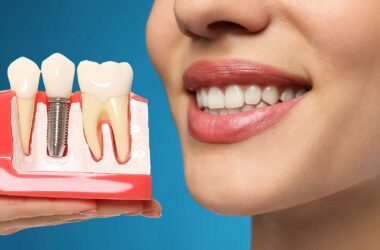Understanding Dental Implants: Mechanisms and Benefits
1. The Implant Procedure: A Surgical Foundation
The dental implant procedure involves surgically placing a titanium post into the jawbone. This post acts as an artificial tooth root. Over several months, a process called osseointegration occurs, where the bone fuses directly to the implant surface. This creates a stable and secure foundation for the replacement tooth. The entire process, from initial consultation to final restoration, typically takes several months to ensure proper healing and integration.
2. Osseointegration: The Key to Success
Osseointegration is the biological process that allows dental implants to become permanently integrated with the jawbone. Titanium’s biocompatibility is crucial for this process, as it encourages bone cells to grow and attach to the implant surface. Factors affecting osseointegration include the patient’s overall health, bone density, and the surgical technique used. Successful osseointegration is essential for the long-term stability and functionality of the dental implant.
3. Restoring Function and Aesthetics
Once osseointegration is complete, an abutment is attached to the implant. This abutment serves as a connector for the final restoration, which can be a crown, bridge, or denture. Dental implants restore the ability to chew properly, speak clearly, and smile confidently. They also help prevent bone loss in the jaw, which can occur after tooth extraction. The aesthetic benefits of dental implants are significant, as they provide a natural-looking and feeling replacement for missing teeth.
4. Long-Term Benefits and Maintenance
Dental implants offer a long-term solution for tooth loss, with proper care and maintenance. Unlike dentures, they do not require adhesives or frequent adjustments. Implants also help maintain the natural shape of the face by preventing bone resorption. Regular dental check-ups and good oral hygiene practices, including brushing and flossing, are essential for ensuring the longevity of dental implants. With proper care, dental implants can last for many years, providing a stable and functional replacement for missing teeth.
Exploring the Types of Dental Implants: Fixed vs. Removable Options
Dental implants offer a versatile solution for replacing missing teeth, and understanding the different types—fixed and removable—is crucial for making informed decisions. Each option presents unique advantages and considerations regarding stability, maintenance, and overall functionality.
1. Fixed Dental Implants
Fixed dental implants are permanently attached to the jawbone, providing a stable and secure base for replacement teeth. These implants typically involve placing a titanium post into the bone, which then fuses with the surrounding tissue through a process called osseointegration. Once integrated, a crown, bridge, or denture is affixed, creating a restoration that closely mimics the feel and function of natural teeth. Fixed implants offer excellent chewing efficiency and do not require daily removal.
2. Removable Implant-Supported Dentures
Removable implant-supported dentures, also known as overdentures, offer a hybrid approach. They are anchored to dental implants but can be taken out by the patient for cleaning and maintenance. Usually, a few strategically placed implants are used to provide retention and stability for the denture. This option offers improved stability compared to traditional dentures, reducing slippage and enhancing chewing ability, while still allowing for easy cleaning and access to the underlying tissues.
3. Considerations for Choosing an Option
The choice between fixed and removable implant options depends on individual needs and preferences. Factors to consider include the number of missing teeth, bone density, budget, and desired level of maintenance. Fixed implants generally offer superior stability and a more natural feel, while removable options can be more cost-effective and easier to clean. Consulting with a qualified dental professional is essential to determine the most suitable solution for each patient.Beyond Aesthetics: The Impact of Dental Implants on Oral Health
Dental implants offer more than just an improved smile; they significantly contribute to overall oral health and well-being, impacting various aspects beyond mere aesthetics. Let’s delve into these crucial benefits.
1. Preventing Bone Loss
When a tooth is lost, the jawbone in that area begins to deteriorate due to lack of stimulation. Dental implants, acting as artificial tooth roots, provide this necessary stimulation. This helps preserve bone density and prevent bone loss, maintaining facial structure and preventing a sunken appearance. This is a key advantage over dentures, which can accelerate bone loss over time.
2. Maintaining Adjacent Tooth Stability
A missing tooth can cause adjacent teeth to shift and drift into the empty space, leading to misalignment and bite problems. Dental implants fill the gap, preventing this shifting and maintaining the natural alignment of the surrounding teeth. This stability reduces the risk of tooth decay, gum disease, and temporomandibular joint (TMJ) disorders.
3. Improving Chewing Efficiency
Missing teeth make chewing difficult and can limit dietary choices. Dental implants restore the ability to chew properly and comfortably, allowing individuals to enjoy a wider range of foods and maintain a balanced diet. Improved chewing efficiency also aids in digestion, promoting better overall health.
4. Enhancing Speech Clarity
Missing teeth, especially front teeth, can affect speech clarity, causing lisps or difficulty pronouncing certain words. Dental implants restore proper tooth structure, enabling clear and confident speech. This can significantly improve communication and self-esteem.
5. Reducing Risk of Gum Disease
The gap left by a missing tooth can become a breeding ground for bacteria, increasing the risk of gum disease (periodontitis). Dental implants fill this space, making it easier to clean and maintain good oral hygiene. Properly maintained implants can help prevent gum disease and protect the health of surrounding teeth and gums.
Q&A
Question: Explain the process of osseointegration and why it’s crucial for successful dental implants.
Answer: Osseointegration is the process where the jawbone fuses directly to the titanium implant surface. This creates a strong, stable foundation for the replacement tooth. Titanium’s biocompatibility is key, encouraging bone growth and attachment. Successful osseointegration is essential for the long-term stability and functionality of the implant; factors like patient health, bone density, and surgical technique influence its success.
Question: What are the main differences between fixed and removable implant-supported dentures?
Answer: Fixed dental implants are permanently attached to the jawbone, providing a stable base for replacement teeth. Removable implant-supported dentures (overdentures) are anchored to implants but can be removed for cleaning. Fixed implants offer superior stability and a more natural feel, while removable options are often more cost-effective and easier to clean. The best choice depends on individual needs and factors like the number of missing teeth and budget.
Question: What are some long-term benefits of dental implants beyond aesthetics, and what maintenance is required?
Answer: Beyond aesthetics, dental implants prevent bone loss, maintain adjacent tooth stability, improve chewing efficiency, enhance speech clarity, and reduce the risk of gum disease. Long-term maintenance includes regular dental check-ups, professional cleanings, and diligent daily oral hygiene (brushing and flossing) to prevent peri-implantitis (inflammation around the implant). With proper care, implants can last for many years.
References:
- https://www.209nycdental.com/services/implant-dentistry/implant-dentures-nyc/
- https://www.209nycdental.com/services/implant-dentistry/all-on-4-dental-implants-nyc/
- https://www.centurymedicaldental.com/dentistry/implants/
- https://www.cosmeticdentistsnewyorkcity.com/service/dental-implants/
- https://mymanhattancosmeticdentist.com/2025/07/prepless-veneers-and-more-the-true-composition-of-smile-makeovers/prepless-veneers-and-more-smile-makeover-dr-michael-j-wei-nyc/
Facelift Dentistry NycImplant Doctors Near MeSmile FaceliftBest Dental Implant Specialist Near MeOrthodontic Treatment For Missing TeethReplacement Of Missing TeethTooth ReplacementReplacement Of Missing Teeth With Fixed Prosthesis







